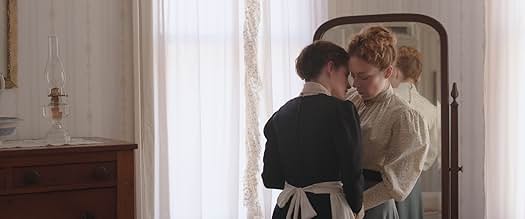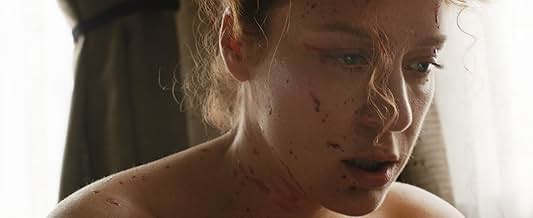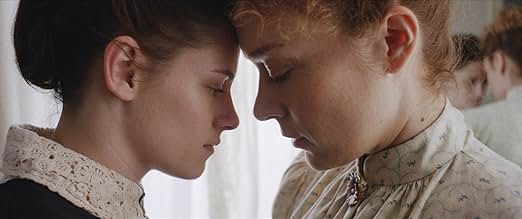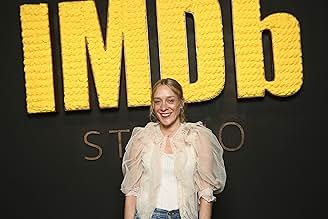CALIFICACIÓN DE IMDb
5.9/10
10 k
TU CALIFICACIÓN
Un thriller psicológico basado en los famosos asesinatos de la familia Borden en 1892.Un thriller psicológico basado en los famosos asesinatos de la familia Borden en 1892.Un thriller psicológico basado en los famosos asesinatos de la familia Borden en 1892.
- Premios
- 1 nominación en total
- Dirección
- Guionista
- Todo el elenco y el equipo
- Producción, taquilla y más en IMDbPro
Opiniones destacadas
I watched this at home on DVD from our public library, my wife skipped, not her kind of movie.
Lizzie Borden is a well established historical figure in the USA. Living in Fall River, Massachusetts, still single and at home at 32, her father and stepmother were found murdered on August 4th, 1892. It was established that the murder weapon was a small ax, several types were found in the home.
Lizzie was always the prime suspect, she was arrested and went to trial in 1893. A jury deliberated for 90 minutes and returned a verdict of 'not guilty.' Of course 'not guilty' isn't the same as 'innocent' and ever since that trial various studies of the sordid affair mostly concluded that Lizzie really was the murderer. Since it was established that the stepmother died over an hour before the father, by inheritance laws the two Borden sisters inherited everything from both parents.
Chloe Sevigny says she has been fascinated by Lizzie for a number of years, here she is both producer and stars as Lizzie. Complemented well by Kristen Stewart as the Irish maid who formed a close friendship, in this movie depicted as a Lesbian attraction. This version depicts Lizzie as the culprit, but the prosecution was unable to provide evidence.
I am not a student of Lizzie Borden's life, I knew very little about the story going into viewing this movie. It is a quite good movie, all the characters come across as authentic. No one really knows for sure what all happened, and what led up to what happened, but this depiction is interesting and plausible.
The IMdb rating appears to be a bit low at 5.7 right now. I see that over 7% of the ratings are "1" which is absurd, those voters must have an agenda other than the quality of this movie. Anyone interested in the Lizzie Borden story would do well to see this movie.
Lizzie Borden is a well established historical figure in the USA. Living in Fall River, Massachusetts, still single and at home at 32, her father and stepmother were found murdered on August 4th, 1892. It was established that the murder weapon was a small ax, several types were found in the home.
Lizzie was always the prime suspect, she was arrested and went to trial in 1893. A jury deliberated for 90 minutes and returned a verdict of 'not guilty.' Of course 'not guilty' isn't the same as 'innocent' and ever since that trial various studies of the sordid affair mostly concluded that Lizzie really was the murderer. Since it was established that the stepmother died over an hour before the father, by inheritance laws the two Borden sisters inherited everything from both parents.
Chloe Sevigny says she has been fascinated by Lizzie for a number of years, here she is both producer and stars as Lizzie. Complemented well by Kristen Stewart as the Irish maid who formed a close friendship, in this movie depicted as a Lesbian attraction. This version depicts Lizzie as the culprit, but the prosecution was unable to provide evidence.
I am not a student of Lizzie Borden's life, I knew very little about the story going into viewing this movie. It is a quite good movie, all the characters come across as authentic. No one really knows for sure what all happened, and what led up to what happened, but this depiction is interesting and plausible.
The IMdb rating appears to be a bit low at 5.7 right now. I see that over 7% of the ratings are "1" which is absurd, those voters must have an agenda other than the quality of this movie. Anyone interested in the Lizzie Borden story would do well to see this movie.
I was more impressed than I expected to be with this film. It is slower paced in the first two acts, but Sevigny and Stewart both deliver performances worth watching, and the smaller details of the story are livened up enough that I was interested throughout. With some films surrounding killers, I feel as if the moment of murder is the only interesting aspects, but with this film, Lizzie's character was compelling enough to keep me engaged throughout. There were a few shakier scenes with some minor characters, and a few scenes that felt a touch overdone, but for the most part this was a very decent film.
As good as the performances are in this film, for a long, long stretch it is very slow and staid. Chloë Sevigny and Kristen Stewart are quite good as Lizzie Borden and Bridget Sullivan respectively. The film looks at Borden's relationship with Sullivan and speculates about its playing a central role in the notorious events that followed. A film taking place in 19th century New England, this is also an examination of how dreadfully repressive life was for women at that time. Sullivan is a household servant of the Borden family but soon finds herself being used in other ways in a patriarchal home.
The film is very much told from Lizzie Borden's standpoint, but does not give too much of a backstory, other than to portray her family as regarding her as insane and in need of institutionalization. In addition, giving the audience a more in-depth sense of Borden's life thereafter is something the film could have done and should have. With that kind of void, we are left wanting. Nevertheless, I recommend this to those curious enough about this story and anyone who admires the work of the two principals.
The film is very much told from Lizzie Borden's standpoint, but does not give too much of a backstory, other than to portray her family as regarding her as insane and in need of institutionalization. In addition, giving the audience a more in-depth sense of Borden's life thereafter is something the film could have done and should have. With that kind of void, we are left wanting. Nevertheless, I recommend this to those curious enough about this story and anyone who admires the work of the two principals.
"Lizzie" chronicles one of America's most famous crimes-the hatchet murders of prominent Massachusetts businessman Andrew Borden and his wife, Abby. The suspect? His spinster daughter, Lizzie, whose name has gone down in infamy.
Originally a passion project for star Chloë Sevigny, around whom talk has circled for nearly a decade regarding a Lizzie Borden biopic/miniseries, "Lizzie" is a well-made psychological drama that will likely satisfy as many people as it will utterly alienate. The screenplay here, as with any kind of historical fiction, takes liberties and makes speculations, the most singular being that Lizzie committed the murders after her father uncovered a romantic relationship between her and the Bordens' house servant, an Irish immigrant named Bridget Sullivan. While this is obviously speculative, when one actually sits and considers the written accounts and evidence, it is not necessarily unlikely, and is a position that has been argued by several historians and journalists. Did it really happen this way? We will never know for sure.
That aside, this take on the material is above-average in many ways: It's well-shot and atmospheric, with just the right touches of the Victorian Gothic. It's also remarkably well-acted, with Sevigny surprisingly turning in a convincing performance as Borden (as a huge fan of her work, I was personally skeptical of whether the role would fit her right). Kristen Stewart is perhaps more shockingly good as Bridget, the servant caught in the eye of the storm. I do feel the film stumbles a bit in terms of its narrative structure, as it begins with a snippet of the crime's "discovery," then loops back to the build-up before cutting away again just before the killings. The gritty details then are presented in a flashback which, though effective, I think would have better served as a straightforward conclusion in a chronological account. The court scenes that rear themselves in the last act, though brief, feel dull and ultimately draw the viewer out of the core narrative; and, given that the audience ostensibly already knows how it ends, I feel the filmmakers would have benefitted from laying the story out in a no-nonsense fashion.
Despite these narrative pitfalls, I still found "Lizzie" a compelling take on a rather common (and frankly well-supported) theory regarding the Borden murders. Did it happen exactly this way? Probably not. But there is potential truth here. And even if there's not, the story itself remains compelling all the same. 7/10.
Originally a passion project for star Chloë Sevigny, around whom talk has circled for nearly a decade regarding a Lizzie Borden biopic/miniseries, "Lizzie" is a well-made psychological drama that will likely satisfy as many people as it will utterly alienate. The screenplay here, as with any kind of historical fiction, takes liberties and makes speculations, the most singular being that Lizzie committed the murders after her father uncovered a romantic relationship between her and the Bordens' house servant, an Irish immigrant named Bridget Sullivan. While this is obviously speculative, when one actually sits and considers the written accounts and evidence, it is not necessarily unlikely, and is a position that has been argued by several historians and journalists. Did it really happen this way? We will never know for sure.
That aside, this take on the material is above-average in many ways: It's well-shot and atmospheric, with just the right touches of the Victorian Gothic. It's also remarkably well-acted, with Sevigny surprisingly turning in a convincing performance as Borden (as a huge fan of her work, I was personally skeptical of whether the role would fit her right). Kristen Stewart is perhaps more shockingly good as Bridget, the servant caught in the eye of the storm. I do feel the film stumbles a bit in terms of its narrative structure, as it begins with a snippet of the crime's "discovery," then loops back to the build-up before cutting away again just before the killings. The gritty details then are presented in a flashback which, though effective, I think would have better served as a straightforward conclusion in a chronological account. The court scenes that rear themselves in the last act, though brief, feel dull and ultimately draw the viewer out of the core narrative; and, given that the audience ostensibly already knows how it ends, I feel the filmmakers would have benefitted from laying the story out in a no-nonsense fashion.
Despite these narrative pitfalls, I still found "Lizzie" a compelling take on a rather common (and frankly well-supported) theory regarding the Borden murders. Did it happen exactly this way? Probably not. But there is potential truth here. And even if there's not, the story itself remains compelling all the same. 7/10.
Just four years after Lizzie Borden Took an Ax and the campy TV mini series it spawned, were audiences really clamoring for another Lizzie Borden film?
An uninspiring cast sleepwalks its way through this speculative take on an all-too-familiar story in Lizzie (2018), written by Bryce Kass and directed by Craig William Macneill. The film pits Lizzie Borden and the family's live-in maid, Bridget Sullivan, against her tyrannical father and unsympathetic step mother in what co-producer and lead actress Chloë Sevigny described as an overtly feminist take.
The film opens in the aftermath of Andrew (Jamey Sheridan) and Abby (Fiona Shaw) Borden's murder. An investigator asks their 32-year-old daughter, Lizzie (Chloë Sevigny), whether her father had any enemies. From there, the film rewinds to the family's employment of a 25-year-old Irish maid named Bridget Sullivan (Kristen Stewart). According to the filmmakers, that was the catalyst for the eventual double homicide, and the answer to the investigator's question. There is never a question about Lizzie Borden's involvement in her parent's death. The obvious foil, and rival for Lizzie's inheritance, her uncle John Morse (Denis O'Hare), serves as a flimsy red herring.
Lizzie's central conflict is between Lizzie, Bridget, and her domineering father, who seeks to control all the women living under his roof. While Lizzie's sister, Emma (Kim Dickens), fades into the background, Lizzie and Bridget find themselves in a compromising position, one that leads to her parents' gruesome murder. Sevigny herself characterized this as a literal "smash the patriarchy" moment.
In real life, Andrew and Sarah Borden were found murdered in their Fall River, Massachusetts home on August 4, 1892. Their middle aged daughters, Lizzie and Emma, lived with them, along with their maid, Bridget Sullivan. There had been significant tension in the family leading up to the murders, and Lizzie gave conflicting alibis. Lizzie was arrested and put on trial. After 90 minutes of deliberation, the all-male jury acquitted her. Her trial was a national media sensation, but to this day, there are many competing theories about "whodunnit."
Like most dramatizations of these events, Lizzie both assumes Lizzie Borden was guilty and that she committed the murders with an ax. In reality, the murder weapon was never determined, though the movie does try to explain why the hatchet in question lacked any evidence of being used in the crime. The film also omitted the food poisoning the family suffered, and the extended trip Lizzie and her sister took prior to the murders. Although the house interior looked accurate, the exterior bears little resemblance to its historic counterpart.
There's also no evidence Lizzie was a lesbian or that she was sexually involved with Bridget Sullivan, or that Mr. Borden sexually assaulted Bridget. That allegation came from mystery author Evan Hunter (aka Ed McBain)'s 1984 novel Lizzie, a work of fiction. Contemporary rumors about Lizzie's sexuality were of the kind gossipers leveled at any unmarried, middle-aged person at the time.
Like Lizzie, Lifetime's biopic Lizzie Borden Took an Ax (2014) also weirdly sexualizes her. Both films depict her as a seductress and show her committing the murders in the nude and drinking alcohol. Lizzie Borden was, in real life, an upper class spinster, Sunday school teacher, teetotaler, and member of the Women's Christian Temperance Union.
Their contemporary revision of Lizzie Borden's personality is where the two films part ways. For all its faults, Lizzie Borden Took an Ax at least accurately portrayed Lizzie and her sister Emma's close relationship, while in Lizzie, Emma vanishes for most of the film. Their actual family dynamic was sidelined to make room for a lesbian fantasy, which at this point is such a boring cliche in feminist film.
Lizzie grossed $642,157 at the box office, and currently holds a 65% rating from critics and 56% audience favorability on RottenTomatoes. The filmmakers were obviously hoping controversy and its two leading ladies would carry their film, but even a contractually-obligated effort on the part of Chloë Sevigny and Kristen Stewart couldn't save this dreary rehash of a 126-year-old unsolved murder.
An uninspiring cast sleepwalks its way through this speculative take on an all-too-familiar story in Lizzie (2018), written by Bryce Kass and directed by Craig William Macneill. The film pits Lizzie Borden and the family's live-in maid, Bridget Sullivan, against her tyrannical father and unsympathetic step mother in what co-producer and lead actress Chloë Sevigny described as an overtly feminist take.
The film opens in the aftermath of Andrew (Jamey Sheridan) and Abby (Fiona Shaw) Borden's murder. An investigator asks their 32-year-old daughter, Lizzie (Chloë Sevigny), whether her father had any enemies. From there, the film rewinds to the family's employment of a 25-year-old Irish maid named Bridget Sullivan (Kristen Stewart). According to the filmmakers, that was the catalyst for the eventual double homicide, and the answer to the investigator's question. There is never a question about Lizzie Borden's involvement in her parent's death. The obvious foil, and rival for Lizzie's inheritance, her uncle John Morse (Denis O'Hare), serves as a flimsy red herring.
Lizzie's central conflict is between Lizzie, Bridget, and her domineering father, who seeks to control all the women living under his roof. While Lizzie's sister, Emma (Kim Dickens), fades into the background, Lizzie and Bridget find themselves in a compromising position, one that leads to her parents' gruesome murder. Sevigny herself characterized this as a literal "smash the patriarchy" moment.
In real life, Andrew and Sarah Borden were found murdered in their Fall River, Massachusetts home on August 4, 1892. Their middle aged daughters, Lizzie and Emma, lived with them, along with their maid, Bridget Sullivan. There had been significant tension in the family leading up to the murders, and Lizzie gave conflicting alibis. Lizzie was arrested and put on trial. After 90 minutes of deliberation, the all-male jury acquitted her. Her trial was a national media sensation, but to this day, there are many competing theories about "whodunnit."
Like most dramatizations of these events, Lizzie both assumes Lizzie Borden was guilty and that she committed the murders with an ax. In reality, the murder weapon was never determined, though the movie does try to explain why the hatchet in question lacked any evidence of being used in the crime. The film also omitted the food poisoning the family suffered, and the extended trip Lizzie and her sister took prior to the murders. Although the house interior looked accurate, the exterior bears little resemblance to its historic counterpart.
There's also no evidence Lizzie was a lesbian or that she was sexually involved with Bridget Sullivan, or that Mr. Borden sexually assaulted Bridget. That allegation came from mystery author Evan Hunter (aka Ed McBain)'s 1984 novel Lizzie, a work of fiction. Contemporary rumors about Lizzie's sexuality were of the kind gossipers leveled at any unmarried, middle-aged person at the time.
Like Lizzie, Lifetime's biopic Lizzie Borden Took an Ax (2014) also weirdly sexualizes her. Both films depict her as a seductress and show her committing the murders in the nude and drinking alcohol. Lizzie Borden was, in real life, an upper class spinster, Sunday school teacher, teetotaler, and member of the Women's Christian Temperance Union.
Their contemporary revision of Lizzie Borden's personality is where the two films part ways. For all its faults, Lizzie Borden Took an Ax at least accurately portrayed Lizzie and her sister Emma's close relationship, while in Lizzie, Emma vanishes for most of the film. Their actual family dynamic was sidelined to make room for a lesbian fantasy, which at this point is such a boring cliche in feminist film.
Lizzie grossed $642,157 at the box office, and currently holds a 65% rating from critics and 56% audience favorability on RottenTomatoes. The filmmakers were obviously hoping controversy and its two leading ladies would carry their film, but even a contractually-obligated effort on the part of Chloë Sevigny and Kristen Stewart couldn't save this dreary rehash of a 126-year-old unsolved murder.
¿Sabías que…?
- TriviaThe photograph in the locket that the fictional Lizzie's father gives her is of the real Lizzie Borden's mother Sarah. She died when Lizzie was a baby.
- ErroresThe end of the film states that Emma and Lizzie had a rift "soon after" the trial and became estranged, but it was actually 12 years later that Emma separated from Lizzie and moved out of their house forever. No one knows for sure what the rift was about, but it's believed by many that Emma discovered Lizzie really was guilty of the murders.
- Citas
Bridget Sullivan: What was I to you? I don't know who you are.
Lizzie Borden: Were you better off before? Is that it?
- Bandas sonorasEbben? Ne Andrò Lontana From 'La Wally', Act I
Written by Alfredo Catalani
Performed by Maria Luigia Borsi and the London Symphony Orchestra, conducted by Yves Abel
Courtesy of Naxos
By arrangement with Source/Q
Selecciones populares
Inicia sesión para calificar y agrega a la lista de videos para obtener recomendaciones personalizadas
- How long is Lizzie?Con tecnología de Alexa
Detalles
Taquilla
- Total en EE. UU. y Canadá
- USD 642,157
- Fin de semana de estreno en EE. UU. y Canadá
- USD 47,580
- 16 sep 2018
- Total a nivel mundial
- USD 844,786
- Tiempo de ejecución
- 1h 45min(105 min)
- Color
- Relación de aspecto
- 2.39 : 1
Contribuir a esta página
Sugiere una edición o agrega el contenido que falta






































